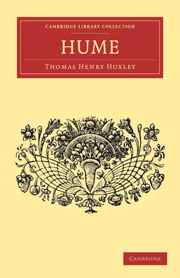
-
Select format
-
- Publisher:
- Cambridge University Press
- Publication date:
- November 2011
- October 2011
- ISBN:
- 9781139084055
- 9781108034777
- Dimensions:
- Weight & Pages:
- Dimensions:
- (216 x 140 mm)
- Weight & Pages:
- 0.29kg, 222 Pages
You may already have access via personal or institutional login
Book description
What is philosophy about? According to the author of this work (published in the first series of 'English Men of Letters' in 1879) it is fundamentally the answer to the question: 'What can I know?' T. H. Huxley (1825–95), the distinguished English scientist and disciple of Darwin, succeeds in giving a clear and succinct account of the way in which Scottish philosopher David Hume (1711–56) answered this question. The book is divided into two parts: in the first, Huxley provides the reader with a sketch of Hume's life, but the main emphasis of the book is in Part 2, where by expounding Hume's views on the object of philosophy, consciousness, theology, language and free will, Huxley guides the reader towards an understanding of how Hume's philosophical principles can be regarded as a search for the ultimate element out of which all valid knowledge may be shown to emerge.
Contents
Metrics
Altmetric attention score
Full text views
Full text views help Loading metrics...
Loading metrics...
* Views captured on Cambridge Core between #date#. This data will be updated every 24 hours.
Usage data cannot currently be displayed.
Accessibility standard: Unknown
Why this information is here
This section outlines the accessibility features of this content - including support for screen readers, full keyboard navigation and high-contrast display options. This may not be relevant for you.
Accessibility Information
Accessibility compliance for the PDF of this book is currently unknown and may be updated in the future.


